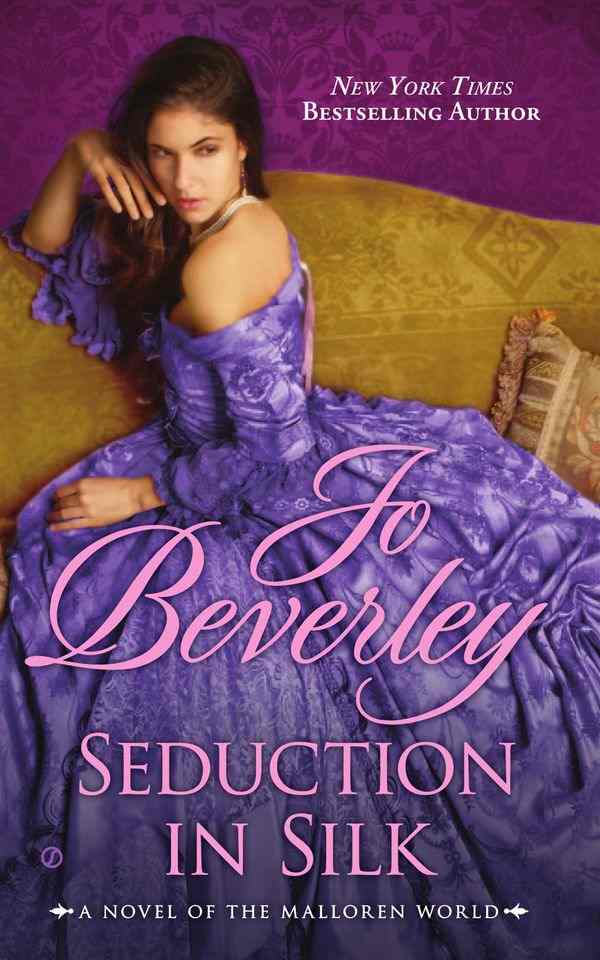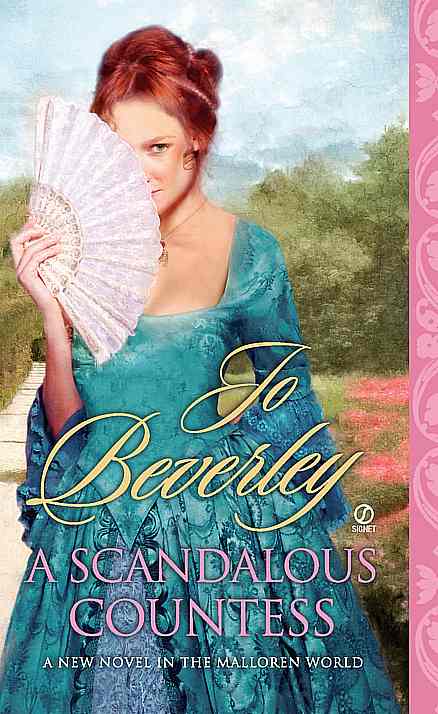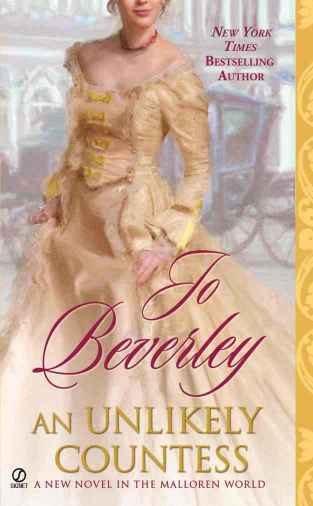
Seduction in Silk
A Georgian Romance
August 2013
Jo Beverley is
A Member of the RWA Hall of Fame
"Arguably today's most skillful writer of intelligent historical romance..." Publishers Weekly
"One of the great names of the genre." RT

A Scandalous Countess
A Georgian Romance

The Demon's Bride.
An e-book novella.
The vicar's daughter becomes embroiled in a pagan festival and a rake's wicked plans.

An Unlikely Countess.
A new Malloren World romance.
Four weeks on the NYT bestseller list!

The Demon's Mistress.
RITA finalist
An e-book novella
A GOVERNESS IN THE AGE OF JANE AUSTEN.
THE JOURNALS AND LETTERS OF AGNES PORTER.
Ed by Joanna Martin. The Hambledon Press, 1998
ISBN 1 85285 164 3
These are my notes of the most interesting aspects of this very interesting book.
Agnes Porter was born in around 1750, and died in 1814. She had earlier positions, but the journals start when she is governess to the children of Lord Ilchester. She seems to be the manager of the children's lives as well as educator, but this also gives her considerable free time. Servants are rarely mentioned, but they are clearly there. Also, Lord Ilchester is an attentive father and often takes some of the children with him on long and short trips.
She has her own apartments and is free to invite friends there, but also spends some time with the family when they dine or spend the evening at home, which is common in the country. In Town, she also has her own apartments, and considerable free time to spend with friends.
Family's time in London was generally about three months between January and May. In 1791 it was January to April.
Some activities: "Went to see the Shakespeare Gallery."
Footnote: Alderman John Boydell's Shakespeare Gallery was in Pall Mall. It contained illustrations of scenes from Shakespeare." It closed on his death in 1804.
"In the evening went with Lady Elizabeth an-airing to Hyde Park. It is there one sees London in perfection: splendid equipages, beautiful women, fine men and spirited horses form altogether a delightful spectacle."
"...an airing to St. James' Park."
"At the play with Mr. Williams [and wife] at the Little Theatre, Haymarket -- The Busy Body." She was in a box, which seems to be her preference. Elsewhere she notes going impromptu and queuing to get into the pit.
"Disappointed in a box ticket, so resolved to venture to the pit under her husband's care. We accordingly went -- suffered great hardships from the heat and bruises -- the air so bad the lamps were extinguished where we stood. (Waiting in line, I assume.) In utter darkness for some minutes; the heat and press inexpressibly fatiguing; we panted for breath; lost Mrs. Williams, but she happily met with a Welsh gentleman of her acquaintance who took care of her. My hair fell down and got entangled between men's shoulders and elbows -- was afraid of being scalped. Suffered extreme torture, but at last we got in. I rejoiced that we had escaped with our lives and limbs, but resolved to never more to get into a similar predicament."
"Spent the day with Mrs. Pinnock. Carried her to a tavern, where we had a snug and comfortable dinner."
24th April, Easter Sunday. "Drank tea and supped with my good friends the Williams. We went in the evening to the Orphan Asylum [the Foundling Hospital in Guildford Street] the music good, the entertainment delightful..... An agreeable social supper at Mr. Williams'."
Travel. She travels a lot by stage, often overnight.
April 28th. "Rose at four, set off in the five o'clock stage for Sarum." (To visit her mother.)
May 3rd. "Rose at three." Went to Redlynch and went to bed early, tired.
July 30th, she lays out a typical day in the country. At different times she lays out her day, and it's interesting to see how it changes over time as dinner, especially in Town, moves later, and nunch appears.
On this occasion, -he rose at seven, said prayers, then heard the children say their prayers. The children seem to go off with servants to have breakfast, for "Saw my darlings at eight o'clock, happily seated over their milk and bread, then left them with their maid and took a turn around the shrubbery."
She breakfasts at nine, with the children nearby playing then attends to their studies. Then they return to play and she practices at the harpsichord till twelve, then takes them out to the shrubbery. Out till two. "Sent them to dress" presumably for dinner, while she read for an hour. Dined at three.
"After dinner told them a tale, then our little studies, then they played while I was at work an hour." They played a game called "puss in the corner". "Sent them with their maid at seven to supper." She studies an hour, then heard them say their prayers at eight and sees them settled in bed. Retires to her own apartment. Read an hour, said prayers, and went to bed at eleven.
She seems to find her life at this time somewhat lonely and inclining her to sad thought.
She buys a share in a lottery ticket and gets her hopes up. Story of a young lady who bought a sixteenth share of a ticket and won twelve hundred pounds, who then was courted by "a man of fortune" whom she married "and she now rides in her own coach and proves a woman of good sense and merit." This is clearly Agnes's dream. She thought marriage highly desirable and mentions how bleak it is for a woman not to be "the property" by anyone. "I could not forbear partially and deeply reflecting on the ills that single women are exposed to, even at the hour of death, from being the property of no one."
She is a learned woman with a high expectation of her pupils, but she is not what we'd call a feminist, in the sense that she thinks men shaped to provide for and protect, and women to manage the home and support their husband's needs.
She is about 40 when she writes asking someone to address their letters to "Mrs." as being more suitable to her age. But in the same letter she jokes about her hopes of marriage, showing they aren't entirely dead.
1794, Lady Mary marries. Lady Mary's husband, Thomas Mansel Talbot was the greatest land owner in West Glamorgan with an income of L8-10,000 per annum.
Lady Mary is the second daughter, so there doesn't seem to be any hangup about older daughters marrying first.
1796, Lady Elizabeth marries. "My dear Lady Elizabeth was married to Mr. Talbot, cousin to her brother-in-law. At two the company assembled in the drawing room -- present, her father, Lady Ilchester, Lady Harriot Acland (aunt), Miss Acland (cousin), her sister Harriot, the children and myself -- Mr. Charles Strangeways, her uncle, performed the ceremony. Her father gave her away; her voice trembled, but she did her best -- did not articulate the word `obey', but behaved on the whole very prettily -- was dressed in a green riding habit, black hat and feather; a long white veil fell down over her face. In a quarter of an hour the happy pair set off for Bath -- they went to dear Mrs. Gumbleton's, where they spent a fortnight in her company, after which they went to Wales.
(This took place in London. London to Bath is bit over 100 miles, so they must surely have spent their wedding night at an inn en route. However, given Agnes's common practice of traveling through the night on the stage, perhaps not.)
Overview of stay in London in 1796. "During my stay in London I visited my friends Dr and Mrs Macqueen, Mr. and Mrs. Moser, and Mrs. Pinnock. I went twice to the play; went also to the Shakespeare Gallery -- poets etc. I went several times to my dear sister's at Hadley (close to Barnet, about 10 miles north of central London.)... During our stay at London my dear pupils made great progress with their masters in music, drawing and dancing. I superintended as well as I was able, and made them practice in the intervals. The Reverend Mr. Griffith attended Lord Stavordale (son and heir) two hours every day for his Latin -- by often sitting with them I got all the declensions pretty perfect."
13th June, left London in the evening on the mail. Traveled all night, and reached Melbury the next day. (Just north of Dorchester. About 110 miles.) The children have returned to the country with their parents and Agnes is taking time for some visits.
She rejoins the family, and at this point she has hopes of Mr. Griffith and this account shows what she considered proper. She was very aware of the proprieties, she this must have been appropriate behaviour.
"The family went to Sherbourne, leaving the three younger children, Mr. Griffith and I to keep house. I invited them all to tea -- after tea I played drafts with Mr. Griffith. I made the children stay to supper with us -- they left at half past nine. I then desired a servant to bring my candle at ten -- till then. Mr. Griffith and I chatted together..... the servant then appeared and I wished him good night, as I generally sup in my own room."
He turned out to be married, which he had kept from everyone.
A day in July. "Tuesday: rose at seven; heard my dear children read as usual etc; walked out with them half an hour. After breakfast our studies till two o'clock. My dear younger pupils read and wrote French; read and wrote English; did a sum; wrote a copy, and practiced music. Colonel Strangeways dined at Melbury. (Presumably dinner at two, which fits their usual pattern.)... After dinner my dear Lady Louisa was with me two hours -- work and history formed our amusements. Mrs. Strangeways drank tea with us. We had a dance after tea -- my partner Colonel Strangeways. Danced till I could dance no more; came up to my apartment; read half an hour in Paul et Virginie - wrote my journal; said my prayers, and went to bed.
On another date, tea was at seven, on another six. Supper came afterward, just before bed.
On another, dressed for dinner at three and dined at four. Tea at seven.
October 1796, she visits friends and plays whist until late. "At twelve o'clock a coach was at the door..." and she goes to where she is staying.
On travel, one note of interest. "Sent and ordered a post chaise to take me to morrow at eight o'clock to Dorchester."
I had concluded that this was the common system. To send for a post chaise as we would a taxi, to take people to the nearest coaching inn.
In planning for the family's stay in London in 1797, Agnes finds out she is not to have her private parlour there, and this seems to settle her mind to give her notice. She was probably not getting along with the new Lady Ilchester. She has another position in mind, as companion to a friend who is now a widow. She is to leave in September.
She used "nunched" as a verb, and nunch as a meal, but never nuncheon. It seems to be specifically attached to the intent to dine later -- ie five or later.
27th April 1797, Lady Harriot is presented at Court. She's 19.
"Lady Ilchester, Lady Elizabeth Talbot [sister], and Miss Lily Digby [cousin] accompanied her. They were all most elegantly dressed and looked extremely well indeed. Lady Harriot's dress was a crape white petticoat trimmed with silver flowers, a wreath of pearls in her hair, large pearl earrings, and a laylock [lilac] gown. Lady Elizabeth's was simple: elegant white and silver. Lady Ilchester, a pale yellow gown with a white petticoat, large emerald earrings set in diamond; a diamond feather in her hair of remarkable lustre. They all had feathers. Miss Digby's dress was laylock and white with bugles.... Lord Ilchester was in purple and silver. Lady Harriot Acland and Lady Mary Talbot came to see them dressed. Lady Mary and Mr. Talbot dined with my pupils and me. All the menservants were gone to St. James's -- Lord Stavordale put the first dish on the table and helped to wait at dinner. [He's ten.] We were very merry on the occasion -- my dear sister was with us, and went with me to drink tea at Mrs. Williams'."
In London in 1797, she invited a man in to visit her. May 4th. "I drank tea with Mrs. Churchyard: a worthy, sensible woman, Lady Harriot Acland's housekeeper. In my return home, was overtaken by Mr. Richards, who saw me to the door. It was but eight of the clock, so persuaded him to sit an hour with me and eat a bit of bread a cheese. We conversed till ten..... I saw him downstairs and was called then into the drawing room to see the masks before they set out for their entertainment. Lady Ilchester was in a black domino; Lady Harriot Strangeways and Miss Digby were country girls and looked very prettily. Mr. Neave, Lady Ilchester's brother-in-law, was to be their conductor. [I assume this means escort.] Lord Ilchester asked me to sit with them half an hour."
May 26th. "My pupils gave a ball. They behaved very prettily and attentive to their visitors.... A grand supper and then the dance was resumed. My sister and I staid to the last and went to bed at two in the morning."
The unmarried girls are at this time 19, 13, and 12. I'd think the younger ones were too young, but she says all her pupils slept in the next morning, so perhaps they were there.
In 1799, the friend she was living with died, and she goes to be companion/governess to her former pupil, Lady Mary. There seems to be an assistant governess, and she lives there almost as one of the family.
February 1803, she visits her sister and gives the times of meals. "We breakfasted at nine, dined at three, tea at six, and supper at nine."
She enjoys cards, and for money, though small stakes. When they are playing with children, very small. "We... had a hand at quadrille with the young people at a penny the dozen fish." (Fish were counters.) "We had a hand at penny quadrille."
"With a large card party at Mrs. Vilett's -- a little music, a deal of chat, with a tincture of scandal: Lady Meredith was talked of for being turned out of the Rooms at Bath by the Master of Ceremonies for having no sleeves to her cloaths -- the naked elbow appears every where with impunity, but the arm above it is not to be revealed as yet."
March 1804. On titles.
"Lady Elizabeth says it is not tonnish to say Captain or Major -- nothing under a General." This is clearly a new fashion and one she's uncertain about.
Elsewhere, Agnes refers to the wives of officers using the ranks.
"Mrs Major Balfour" "Mrs Colonel Dallas"
Another typical day. They eat at one, but it is the children's dinner, and her nunch.
"they come to me at half past seven and stay near three hours, then I breakfast with their papa and mama. I then am by myself until one o'clock -- I walk, work, read and write at pleasure. I again meet my pupils at their dinner and my nunch at one, and they stay with me till half past four. I then dress for dinner at five. The children come in at desert and continue in company till eight. I then very often see the two elder young ladies put to bed, and after that return below stairs to the drawing room till ten. Then to bed."
In 1804, staying at her sister's house, the schedule is more old fashioned. "We rise at six, breakfast at eight, dine at three, and sup at half past eight. Prayers half past nine, and to be at ten."
In 1806 she left her position with Lady Mary due to age and ill health, and went to live with her married sister, but she returned to the Talbots now and then when required, especially if the parents had to be away for any length of time.
It seemed to be the practice for the young ladies to hold an entertainment at about age sixteen to practice their hostessing skills and to grow acustomed to social events. I assume that with a number of young ladies in the neighborhood doing this, they had a number of events to look forward to.
Letter, 6th June 1811 to Lady Mary Talbot.
"Yesterday was Miss Talbot's grand gala. Present: the Miss Lucas's, the Miss Collins, Mrs. Collins, and Mr and Mrs. Edwards. The number in all (reckoning Mr. John Collins) was fifteen. Tea at six and the ball commenced at a little after eight and finished at a quarter past ten. Then some refreshments were offered, and received most heartily. The dancers retired at eleven, and I remained with Mr. and Mrs. Edwards till twelve. Miss Talbot gave a general invitation to stay all night which I perceived was a very agreeable circumstance to the party, as it rained a torrent and the winds sounded tremendous after the soft, feet-inspiring tones of Mr. James George's violin....
[Next day]Miss Talbot and Miss Bere are now doing the honours of the garden. The younger Miss Lucas's and the two darlings are at play around me, keeping house and school, at which the youngest preside with all confidence and allowance. Miss Jane is shewing the `Antiquities of Pozzuoil and Baja' to Miss Caroline and Maltilda, who are waiting for their carriage."
See also Some letters from Miss Weeton's journal of a governessTo keep up to date about my books you can join my newsleter, as below, and/or Like my author page on Facebook.
To receive my occasional newsletter in your e-mail, you can sign up below.
These addresses are never shared or sold, and you will receive nothing from this list other than Jo Beverley's newsletter and an occasional update from her about late-breaking news.
| Subscribe to Jo Beverley's Newsletter list. | ||
| Browse Archives at groups.google.com | ||
Like the above list, there's no chat or spam. All you'll ever receive is the newsletter and occasional updates with late-breaking news.
If you'd like to talk to other readers about my books, you can join a chat list by e-mailing here
If any of this web site is difficult to enjoy, please e-mail here